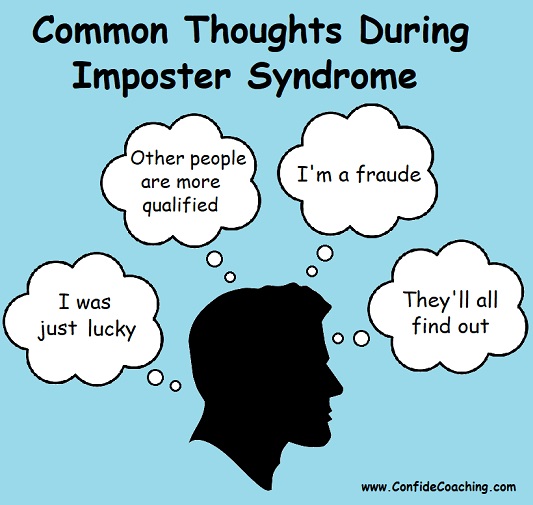
Ever feel like a fraud? One of the greatest hurdles to achieving your goals is the fear that you’re not worthy and that you couldn’t be even somewhat qualified, despite evident success. This is, in short, the definition of imposter syndrome.
Such self-doubt can plague anyone, especially those stepping into new roles. Be it college graduates, new mothers, medical doctors or presidential candidates.
At the root of imposter syndrome is the suspicion that you’re just not good enough and that you could be exposed at any moment. And you’re not alone.
Shortly after winning an Oscar, actress Viola Davis describes the self-doubt she experienced all through her years as an actress. “It feels like my hard work has paid off, “ she said, “but at the same time, still feels like she’s going to wake up… and everyone’s going to see her for the hack she perceives herself to be.”
If ever there was a perfect description of imposter syndrome, this is it. By the time she won the Oscar, she already had a Tony and an Emmy award under her belt. Absolutely no one doubted that she deserved the recognition. No one but her, that is.
Like Viola Davis, many people have quite the gap between what their abilities are and what they perceive them to be. If you’re feeling like a fake or undeserving, your inner critic is undervaluing you.
Everyone suffers from imposter syndrome at some point – here’s how you can handle it.
Understanding Imposter Syndrome and Why You Have It
What can you do to overcome the feelings of inadequacy that plague so many people? First, it starts by recognizing it in yourself and others.
Imposter syndrome is a feeling stemming from the belief that you’re not as competent as others perceive you to be. You’re successful, but you feel like a fraud at work. It roots in the idea that your success is majorly due to luck as opposed to your talent, hard work or qualifications.
Social psychologists have studied this phenomenon since the 1970s. Imposter syndrome can affect people’s lives and goals in an unexpected way. People who score high feelings of inadequacy tend to be less confident, moodier and easily rattled by performance anxieties.
While for some people, imposter syndrome can fuel feelings of motivation. However, the caveat is that it still shows up in the form of constant anxiety. It can become a vicious self-perpetuating cycle.
Why do people experience imposter syndrome? There’s no single answer to this question. Human beings are psychologically complex entities, and imposter syndrome manifests differently in each person.
Some people have more anxious or neurotic personalities. For others, feelings of inadequacy may originate from childhood, where they internalized the idea that they must achieve in order to be loved or lovable.
Famous People with Imposter Syndrome
Academy Award winners Viola Davis and Tom Hanks have both felt like imposters despite their public success and millions of fans worldwide.
How to Deal with Impostor Syndrome
Unfortunately, impostor syndrome isn’t something that just goes away with time. You could receive recognition for your work and a myriad of awards and still feel unworthy or like you don’t belong.
If you’ve found yourself in such a position, you’re in good company. A great example of this is Tom Hanks, who, despite being one of the most beloved actors of his generation and having won two Academy Awards, still feels like a fake.
He’s described the feeling as “a high-wire act that we all work.” His solution is to show up even when he doubts his abilities. And this is a great way to deal with it.
One of the first steps to combating imposter syndrome is to simply acknowledge the thoughts and put them into perspective. Don’t let your fears hinder you from experiencing life or going after your goals.
Learn to observe your thoughts instead of wallowing in them. Start by asking, “Does this thought help or hinder me?”
You can also reframe your thoughts. To move past these feelings of self-doubt and low self-worth, you need to confront some of those profoundly ingrained beliefs you hold about yourself. And this won’t be easy.
Sometimes you may not even realize you have self-limiting beliefs. Some common thoughts associated with imposter syndrome include:
 “I feel like a fake” – This goes hand in hand with a fear of being “unmasked” or “found out.”
“I feel like a fake” – This goes hand in hand with a fear of being “unmasked” or “found out.” - “I must not fail” to avoid being found out.
- “Other people are more talented/qualified” – you don’t feel you should be recognized as others should.
- “It’s all down to luck” – Attributing success to external factors other than your abilities is a limiting belief that results in an inability to enjoy success.
Such thoughts only fuel the concerns you have about being unfit or undeserving. In contrast, you should cultivate a learning mindset and understand the power of perspective.
Working on Negative Self-Talk
Here’s what you can do to mitigate years of negative self-talk and turn your inner-critic into your secret weapon.
- Rewrite your mental programs and get rid of the negatives. Remind yourself that it’s normal not to know everything and that everyone has a different path in life
- Talk about your feelings. Don’t harbor negative thoughts alone. They will wear you down with time, leaving you numb or hopeless.
- Recognize unhealthy perfectionism. Being constantly worried about making mistakes or extremely fearful of failure are signs of unhealthy perfectionism. Perfection is not a goal. Instead, learn to accept when something is good enough.
- Learn to assess yourself realistically. Are you really undeserving?
- Be kind to yourself and seek support. Don’t forget to reward yourself for your successes. And remember to forgive yourself when you make mistakes.
Embrace the Imposter
Imposter syndrome doesn’t typically go away on its own. It stays with you. Self-doubt is something you’ll have to deal with for the rest of your life. Acknowledge these feelings when they crop up. You can still have an imposter moment but don’t accept an imposter life. So, change the way you talk to yourself.
p.s. – Does Imposter Syndrome stop you from taking actions in line with who you are? Book a free trial session and let’s have a casual chat.

Paul Strobl, MBA, CPC
Owner of Confide Coaching, LLC
Paul is a Master Life Coach for GenX and GenY executives and business owners. Originally from Houston, Texas, he has been location independent for most of his adult life. He currently resides in the Rhodope Mountains of Bulgaria near the Greek border with his brilliant wife, 14-year-old stepson (officially adopted in 2021!) and a Posavac Hound rescue.



